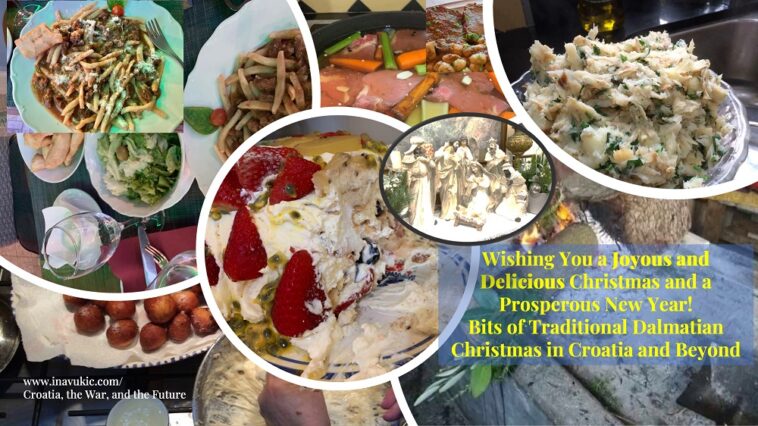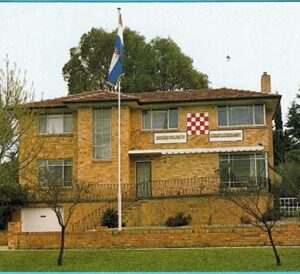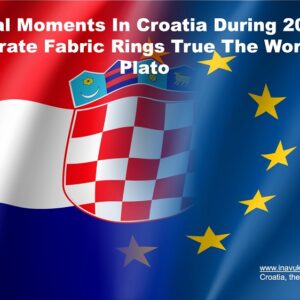Taking a couple of weeks break from writing and blogging. Thanking you all on your support and visits to my blog website. Wishing you all a happy and blessed, joyous and delicious Christmas and a most joyous 2024!
Christmas time of the year almost instinctively brings to us memories of our childhood and the joy we spent surrounded by family and friends. I am no different and so, I am dedicating this post to the old traditions and specialties of food that the Christmas table brought me when I was a child.
I have spent most of my childhood growing up on an island along the Dalmatian coast in Croatia and, naturally, the traditions and customs loved then, have followed me wherever I went. Modesty is one word that can best describe Dalmatian Christmas traditions in the past. During the holidays, it was expected that at least a decanter of wine would be found at the table. But that’s why the customs associated with the holidays are quite rich, and in many places, they have been preserved to this day.
I hold that Christmas is the most wonderful time of the year, a time of peace, love, family gatherings at the holiday table and traditional gastronomic specialties. Family and delicious food are exactly what makes the holidays so special and here I bring forth some of those dishes.
According to tradition, on Christmas Eve, the day before Christmas, meat is not eaten, just fish.
Christmas Eve
On Christmas Eve, old customs are cherished in many parts so fish, most often dry cod (bakalar) is traditionally prepared. It is interesting how cod was found as an unavoidable dish of Dalmatian cuisine on Christmas Eve. The maritime tradition, which is characteristic of Mediterranean countries, was introduced to all tables by cod, as a symbol of prosperity as is not hunted in national waters but imported cod is still obligatorily prepared on Christmas Eve, usually `on white ‘with the addition of wine, spices and potatoes. Dalmatians will make “cod on olive oil”, cooked on white and with potatoes and richly seasoned with olive oil, garlic and finely chopped parsley. While odorous, to put it mildly, to cook, and although the smell of dry cod lingers on in the whole house for hours, this dish is an absolute delicacy.
In Dalmatia, doughnut balls (fritule) are still made like long time ago, which are mixed in many places after dinner on Christmas Eve. These desserts are certainly a sweet childhood memory of almost every one of us who grew up along the Dalmatian coast and on many islands, and although they are relatively easy to make, but require rather masterful squeezing of dough in hand and scooping off with a spoon to drop into sizzling oil, these days we do not see them on the table very often. Indeed, on only special days, mostly for Christmas Eve and Good Friday, every house smells of fritule.
The tradition of bringing a Christmas log of an olive tree into the house in the evening of Christmas Eve, placing it on the fire, and keeping it burning throughout Christmas Day and even couple of days after, has been going on since ancient times. The family would pray next to the, pour oil and wine over it, and sprinkled it with grain before it would be placed on fire. It is believed that the log (Badnjak) needs to burn all the way through to Christmas Day and beyond as a symbol of light on the night of Christ’s birth. After that, the ashes from the burned log would be sprinkled on vineyards, fields, and orchards, and it was believed that this act would bring a fruitful year.
In the Croatian folk tradition, customs and ceremonies related to the Christmas log were practiced in an authentic form until the appearance of wood-burning stoves, due to which, among other things, changes in social and economic life and the ceremony of the entire custom were gradually reduced. Although open fireplaces ceased to exist in most houses the process of bringing the log into the house is still carried out on a symbolic level, often decorative log. An olive tree branch above the door or some other shortened version, preserving heritage and cultural heritage.
Christmas Day
In Dalmatia, pašticada (beef stew) and roasted turkey are mostly often prepared for Christmas lunch. Except those tasty meat dishes, one can also find brudet (seafood stew) on the Christmas menu. There are several original recipes for pašticada, but it is essentially tender meat cut into pieces and stuffed with garlic, marinated overnight with celery, carrots, Bay leaf, garlic, peppercorns, wine and vinegar, simmered slowly in tomato-based pasta sauce and served with gnocchi or homemade pasta. An alternative to pašticada in the village I grew up in on the Island of Korcula are homemade macaroni pasta topped with beef pasta sauce and this also is a delicacy and a truly special treat. Clearly, Christmas Day traditional lunch dishes in Dalmatia require lots of love and hard work on the cook’s part. It is, after all, the birthday of Jesus Christ.
After the Pašticada or another main meal, the locals usually treat themselves to delicious rožada. Rožada or Rozata is a traditional medieval dessert that comes straight from the city of Dubrovnik. It is something between Crème Brûlée and flan and is usually topped with delicious caramel sauce before being served. Sometimes it is also served with fruit.
Given that Christmas Day in Australia is a summer’s day, people from Dalmatia, Croatia, spending Christmas there the choice of cream cake dessert is usually away from Rozata and into the always popular Pavlova made into the shape of a log or strudel!
Christmas desserts usually, besides the main dessert, include small cakes of nibble size, so the sweet pleasures last for hours and days even and are divided into two types: dry and cream cakes. The practice is to bake dry cakes sooner because they can be eaten longer, while housewives pay attention to creamy desserts just before Christmas. Dry desserts include various tea cookies, nuts, rolls and similar cakes, while in the second type of cake, mađarice (layered chocolate slice), chocolate cubes or honey pie are prepared. In addition to the already mentioned fritule, kroštule (krostoli) are also popular in Dalmatia, which are like crispy donuts in taste but rolled flat and thin and fried, often cut into bow shapes.
I wish you all a joyous and sweet Christmas and a prosperous New Year!
Ina Vukic




